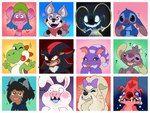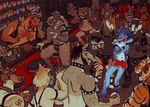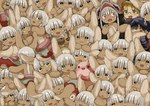
large group
Tagged for large groups that have a minimum of ten participants.
- If the participants are engaged in sexual activities, then add mass_orgy.
- If the participants are mainly bystanders and/or onlookers, then add crowd and/or audience.
What exactly counts as a character?
- Any creature present within the scene, in whole or in part (including things like disembodied hand and disembodied eyes).
- If they aren't visible at all (e.g. only speech bubbles) they DO NOT count; see offscreen_character instead.
- Someone interacting with the scene whose likeness is visible (e.g. on screen in a video call, a cutaway, etc.).
- Someone present in static media, such as a photograph, when only static character likenesses are present (Example).
- Multi-headed characters are counted only once. Do not count each head as a separate character.
- Inanimate objects require evidence that they are living to qualify as characters. Some leeway is given to mechanical beings such as robots, androids, animatronics, and mechs.
- The latter is likely a grey area, and may depend on if the mech is being self-controlled, being controlled by an operator. It probably is a good idea to not count the mech itself as a character if the mech operator is visible inside the mech to avoid double counting.
- Most often, it does not matter how small, distant from the viewer, detailed, or important to the scene a character is, they count.
- A silhouette counts as a character only when it is not a shadow of an offscreen character.
- Ambient creatures are not treated the same as other "background" characters, and are treated differently in how they are counted. Apart from there being a distinction in how we tag ferals, anything that fits the idea of a background character will count.
Except if the following is true
- Tentacles only count as characters if attached to a visible creature (octopus, tentacle monster, etc.). For instance, a picture of just tentacles would actually be tagged as zero pictured.
Ambient creatures
An ambient creature is defined as a feral or unrecognizable creature that does not interact, have no personality, and clearly not the subject of the post.
What species are included?
- A wide range of species could, in theory, qualify as an ambient creature. The most common interpretation excludes most mammals, except for maybe the rodent family, and bats, and includes feral insects, reptiles, birds, and a wide array of marine life.
Do they count as characters?
A. It depends.
Most examples that commonly receive an ambient tag generally do not need to be counted as characters. Although, there are many situations that blur the line between relevant, and serves as a background detail. Please be careful with creating assumptions associated with content that gets added to an ambient tag. Opinions can vary widely as to what is considered ambient, with perfectly countable characters sometimes making it into the tag.
- If the ambient creature is a mammal, or some form of custom, or mythological species, it might end up relevant enough to the scene to qualify.
- Excluding ambient things from the character count addresses situations involving distant creatures such as ambient birds, or very small creatures like firefly orbs, and most other insects placed in a manner deemed unimportant to the scene.
How to handle multiple characters/images
In most situations, the number of distinct characters in the post will reliably tell us which character count tag to use. This is not always the case.
- For instance, a user avatar probably isn't going to affect the character total, but a cutaway certainly could.
- The post could fall under a special case theme (listed below), the most relevant being multiple_images, which could contain multiple character count tags.
Multiple images
The wiki for multiple_images contains information on how to identify and tag the theme.
Here is what you should do if there is difficulty determining if there is one unseparated image, or multiple separate images.
The general practice is to favor the unseparated image versus having multiple distinct images when it is very difficult, or impossible to tell if multiple_images should apply. For instance if a post has three characters and it is really hard to tell if it is one scene (trio), or a solo + duo scene respectively, it is suggested that the situation be treated as a trio instead.
Special cases
In the vast majority of cases (exceptions being clone, square crossover etc.), the presence of a character is counted only once even if they appear multiple times across an entire post. The same character may be counted towards different character count totals, but must not be counted more than once in any one total.
These tags may have special rules / treatment
Self-contained image sets, model sheets, sketch pages, picture in picture
The section involves the concept of multiple images, and related themes, namely posts that contain multiple instances of imagery considered separate for tagging purposes.
These are tagged separately per instance (image), which includes character totals. For instance, it is very possible for a post to have both solo, and duo applied.
Comic pages and sequences
These are tagged cumulatively by scene. For instance, two characters talking to each other is tagged as duo, not solo, even if drawn in separate panels.
Character count tags:
- solo
- duo
- group
- trio
- large group
- zero pictured
See Also:
This tag implicates group (learn more).
The following tags implicate this tag: absolutely_everyone, mass_orgy (learn more).
Posts (view all)



